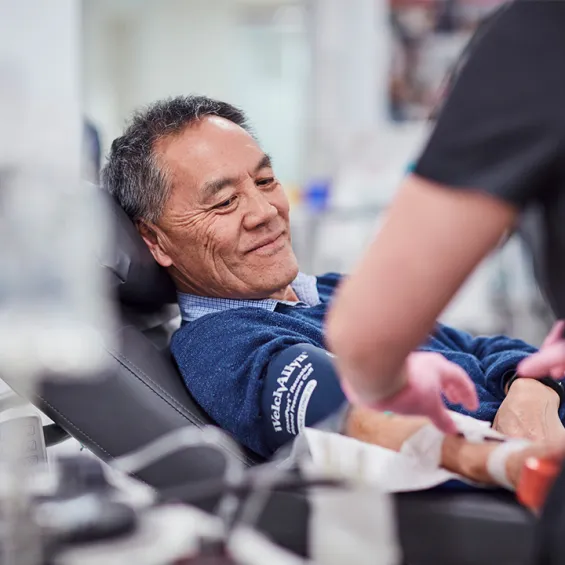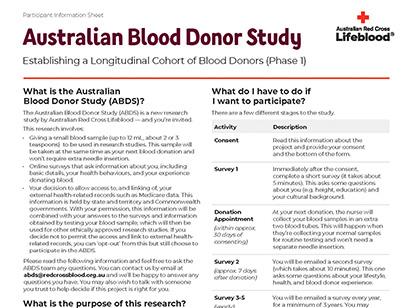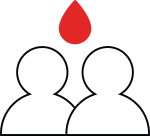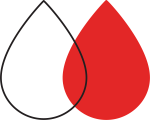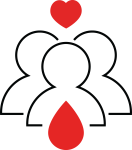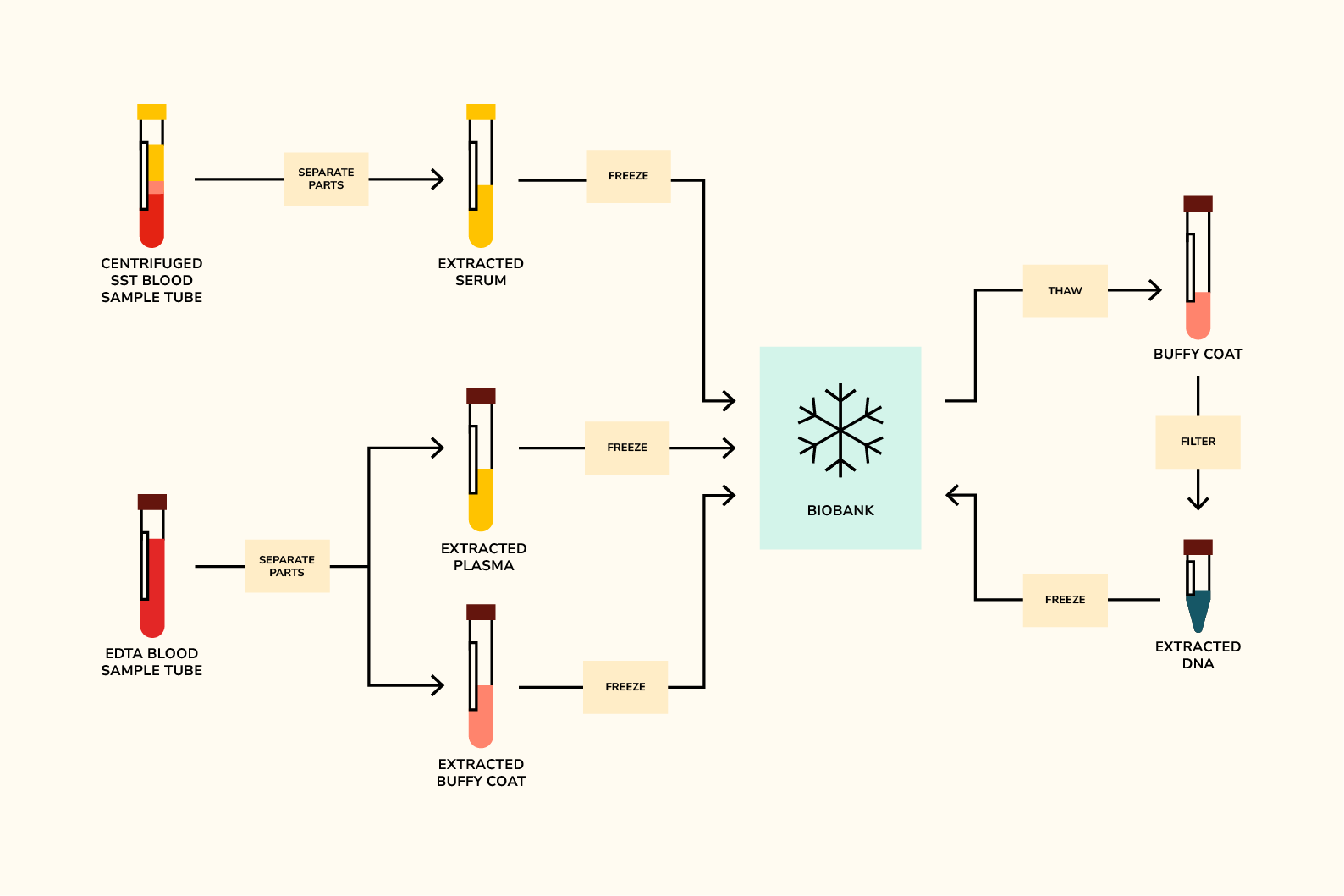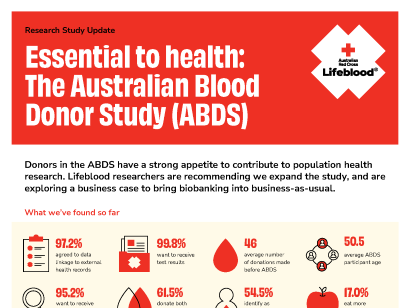Australian Blood Donor Study
The Australian Blood Donor Study (ABDS) has collected survey data and blood samples from eligible donors who've agreed to take part. This research will keep blood donation safe for donors, and the blood we transfuse safe for those who receive it.
We've built a library of data and blood samples that we're calling the ABDS biobank. This important long-term resource will enable us to carry out further ethically approved health research in the future.
In late 2025 or early 2026, we'll be sending more email invites for eligible donors to participate in the study. You can download a copy of the participant information sheet below, and learn more about what we've found so far.
What have we found so far?
So far, your data has started to give us a picture of who you are: all 9,080 of you.
Our findings are still in the early days, but we’re excited about what it could mean. With a whopping 97.2% of you consenting to link your data to health records, the future of our research goes beyond our imaginations.
And that research is made possible by the 6,453 samples you’ve given.
We keep going on about iron after donating — and about a third of you have been putting in the extra effort by either taking supplements or increasing your intake through diet. Congrats!
As for where you’re from? Unsurprisingly, most of you — 73% — were born right here in Australia. 89% report European ancestry while 3.2% mentioned east and south-east Asian ancestry. Another 2.2% reported central and southern Asian heritage.
We can’t wait to learn even more about you.
Here are the highlights
FAQs on participating in the study
- About the study
What’s this study about?
The Australian Blood Donor Study, or ABDS for short, aims to facilitate research into blood donation and donor health through the collection of blood samples and data from Australian blood donors. If you join the study, we’ll collect a small sample (up to 12 mL, or about 2 or 3 teaspoons) of blood at your next donation and ask you to complete a few surveys. With your permission, we may also link the information collected in this study to your other health data (such as Medicare records).
We’ll use this information to create a biobank at Lifeblood. This will be a vital resource for researchers at Lifeblood and their collaborators at other institutions to make scientific discoveries about blood donation and blood transfusion, as well as improving population health, and improving diagnosis, treatment, and prevention of human diseases.
Who’s running the study?
The study is being led by researchers at Lifeblood in collaboration with researchers from Australian Universities.
Your information and blood samples will be managed by Lifeblood. Dr Surendra Karki is the lead researcher on this project.
What is a biobank?
A biobank is a stored collection of human biological samples like blood or their products (e.g. DNA). Biobanks are an important resource for medical researchers to improve the understanding of diseases and to help find better ways to prevent or treat them. Biobank samples and associated health information are de-identified, stored securely and are only used for ethics-approved medical, health and blood donor related research projects. This includes research on the cause, prevention, risks, diagnosis, and treatment of disease, as well as genetics research and clinical trials.
How is this study different from regular blood donation?
If you join the study, we’ll take an additional sample of blood (up to 12 mL) at your next blood donation at the same time the nurse takes the routine testing samples. You won’t need an extra needle.
We’ll also ask you to complete a short survey before your donation, and another survey a week after your donation. You will be also invited to complete online surveys every 12 months for the next 3 years, but you can decide to complete those surveys or not at that time of invitation.
- Your participation
Why have I been asked to take part in this study?
You’ve been invited to participate because you’ve donated before, and you have another donation booked at one of our participating donor centres in the next few weeks.
Do I have to participate in the study?
No. Being in this study is completely voluntary and you don’t have to take part. Your decision to participate will not affect your current or future relationship with the researchers or anyone else at Lifeblood.
What does taking part in the study involve?
If you agree to participate, we’ll ask you to:
- Complete a short online survey before your donation appointment. This survey will ask you about your demographic information (e.g. height, education), and cultural background.
- Donate an extra sample of blood (up to 12 mL, or about 2-3 teaspoons) for research purposes at your next donation. This will not involve any additional needles.
- Complete a longer online survey a week after your donation. We’ll email you a link to this survey which will ask you about your lifestyle (e.g. diet, exercise), health (e.g. iron deficiencies, your general health status), and experiences of and views on donating blood.
We’d also like to invite you to participate in an online survey every 12 months for a minimum of 3 years. You can decide to participate or not in our follow up surveys at that time.
What will happen during my next donation appointment?
You will donate as usual. For most of you, your nurse will take an extra blood sample (12 mL) in two blood tubes for ABDS. For some of you, the nurse will collect only 6 mL blood in one blood tube and for some, the nurse will not take any blood sample for ABDS. This is because there’s a maximum volume of blood that can be taken for samples from a donor, and there are other mandatory samples to be taken as a part of your donation.
Whether your sample was successfully collected or not, if you attend the centre in the next few weeks while we are collecting samples, you will be a participant for ABDS. The survey data you provide will still be very valuable to us.
Will I get an extra needle?
No. We’ll take the extra sample at the same time as the other samples that are used for routine testing.
What should I do if I want to participate in the study?
We’ll send you an email invite if you’re eligible to participate in the study. If you’d like to join in, read and sign the consent form provided to you in the study invitation email. Then, you’ll get a survey to complete.
Are there any risks in the study?
A possible risk of participating in this study is the discovery of a finding with serious and significant health consequences to you and potentially to your genetic relatives. You can read more about serious health findings in the question What’s a serious health finding?.
We may also test your blood for conditions that do not seriously affect your health, but do affect the health of the person receiving your blood. If you have one of those health conditions, you may be asked not to donate any or certain blood products. You can read more about one specific study testing for a health condition in the question What health conditions will you test for?.
Are there any benefits associated with being in the study?
There are no immediate direct benefits to you from participating in this study. However, we aim to use the study findings to improve the experience of donating blood and ensure a safe supply of blood and blood products for patients in need. The study should provide future indirect benefits to donors and blood product recipients.
Will participating in this study affect my eligibility to donate?
For most people, participation will not affect their future ability to donate blood. There may be some tests performed on your sample that may indicate a condition that may adversely impact the health of the recipient of your blood. Our medical officers will contact you if this happens. They will follow up with you or refer you to your GP, and you may need to wait before you donate again. Further, if tests performed on your sample indicate certain conditions which suggest that it may be beneficial to your health to delay your next donation or donate a different kind of blood product such as plasma, then you may be contacted by Lifeblood.
What’s a serious health finding?
“Serious health finding” in this research is a discovery of a condition (genetic) that has serious health consequences for you and potentially to your genetic relatives. It’s uncommon for researchers to discover a serious health finding through research, as they usually run a limited number of tests on samples. However, it is possible that research on your blood sample could discover a ‘gene’ that is linked with a higher risk of developing cancer or another life-threatening condition. This may be relevant to you as well as your genetic relatives. If this happens, you may be contacted by a medical expert or a genetic counsellor on behalf of Lifeblood. You’ll be only contacted if the discovered condition is significant, confirmed and can be treated. You’ll not be contacted for general health information such as evidence of higher risk of diabetes. Please continue your regular health check-ups with your GP or your other healthcare professionals.
While consenting for this study, you may choose to be contacted or not if a discovery of a condition is made that has serious health consequences. If you are told about a serious health finding, it may impact your future insurance applications (such as income protection or life insurance) and we recommend you visit your GP to follow up. If you’re concerned about this, please talk to your relevant insurer, GP, or other relevant people before consenting to participate in this research.
Please note that, in Australia, the result of a genetic test has no impact on eligibility for health insurance, or the cost of premiums. The Private Health Insurance Act 2007 prohibits discrimination by health insurers.
If you initially consented to hear back a result with serious health findings from us but change your mind later, you may contact the study team at any time to withdraw from this.
What health conditions will you test for?
We are not sure of every condition that we will test using your blood sample. But, each research testing these conditions will need to get Lifeblood ethics committee approval.
One of the conditions we’ll investigate using your sample is called ‘familial pseudohyperkalaemia’. This is a hereditary condition where red blood cells leak potassium when they’re being kept at cold temperatures outside of the body. It may occur in 1 in every 500 donors according to research conducted in Europe. This condition doesn’t affect a person’s own health and no treatment is required, but high levels of potassium in stored red blood cells can be harmful for children and babies receiving transfusions. If we find that you have this health condition, we may ask you to stop donating whole blood or certain blood products. We’ll contact you if this happens.
Can I withdraw from the study once I’ve started?
If you decide to take part in the study and then change your mind later, you are free to withdraw from the study at any time. This will not affect your relationship with Lifeblood.
How long will I be part of the study?
The Australian Blood Donor Study will ask you to complete surveys over the next 3 years (one survey each year). You can decide to complete those surveys or not at that time of invitation. Your blood samples may be kept up to 15 years. The information obtained from the survey and from the testing of blood samples may be kept indefinitely for research purposes, even after your incapacity or death.
Will I be told of future studies using information about me?
You won’t be told what research studies your sample or data is used for. This is because the researchers are not aware of all the potential research questions that can be conducted using your sample and data.
- Data and privacy
What information about me will you collect?
We’ll collect your personal information (name, date of birth, address), information about your blood donations, your responses in the ABDS surveys, and information relating to your blood sample.
How will information about me kept private and confidential?
To protect your privacy, your personal identifier information in the blood sample and survey responses will be replaced by a unique study code (deidentification). Your identifiers (such as name, date of birth, address) will be separately stored. Any research analysis and testing will use your deidentified sample or data. If there is a serious health finding based on the testing your blood sample, researchers will report the results using the study code to ABDS team. If this is something that needs to be given back to you, an approved ABDS data custodian in Lifeblood will do the reidentification. This information will be used to contact you. Storage of your information will use strict security and privacy protocols used in Lifeblood.
We anticipate study findings will be published, but you will not be identifiable in these publications and reports.
Who will be able to access information about me?
Your deidentified information and samples will be available only to researchers who have relevant scientific and ethical approvals for their planned research. This may include researchers working outside of Australia.
How long will you keep information about me?
Your information collected during this study may be kept indefinitely. Your blood sample may be kept for up to 15 years after collection.
How will you link my information to external sources?
With your permission, we may also link your research data to other health information about you from external sources such as Medicare data. This information is held by state and territory and Commonwealth governments. Data linkage will be done only for approved research purposes.
Linking of your study data to external health records happens through specialised data linkage agencies such as Australian Institute of Health and Welfare and uses your personal information (such as name, date of birth, address). Data linkage agencies have strict security protocols to exchange your identifier information for the linkage purpose. To identify your data in other health data sets, your identifying information in each data set is matched and a unique code is given to you. Once linkage is completed, your identifiable information is stored separately from other data to protect your privacy.
If you’re concerned about consenting to external data linkage, you can either contact the ABDS study team for more information or opt out from this part. There will be a relevant section in the consent form — just click ‘No’. You can also contact the study team any time in future to withdraw from the whole study or any further external data linkage.
Are there any risks when linking study information to external sources?
Data linkage agencies have strict security protocols to exchange your identifier information for the linkage purpose and transfer of the linked data to ABDS team thereafter. Linked data files will be transferred, and stored in a secure environment that is only accessible by approved researchers.
Should any breach of privacy occur, Lifeblood will ensure the situation is dealt with in accordance with existing privacy laws and guidelines.
Can I opt out of linking my study information to external data sources?
Yes, you can choose to opt out of linking your study information to external data sources when you consent to participate in this study. If you change your mind after you decide to participate, you can withdraw from the whole study or only withdraw from further data linkage.
- Troubleshooting
Why haven’t I been invited to participate?
Not every donor centre is collecting samples, nor is every donor eligible. You may not be donating at a participating donor centre, or you may not be booked in during the time of the study — it’s nothing personal!
Why haven’t I received a survey?
There are several possible reasons for not receiving a survey. For example, your email address may not be up to date, or you may have previously requested that we exclude you from communications about research. Please also check your junk email.
Please get in touch and we can confirm your participation status and contact information.
What happens if I need to change my appointment?
We will only be collecting samples during a specific time period, so we may not be able to collect a blood sample. If you want to make sure you can still participate, please get in touch.
What if I am unable to donate on the day?
There are many reasons why you may not be able to complete your donation. Sometimes your donation may be postponed, or you may have low blood flow. We may not be able to collect a blood sample, but we will still send you a survey after your donation. You’ll still be a participant of the ABDS.
Can I have my blood samples back?
It’s not possible to send you back the blood samples, but we can safely discard the samples at your request if you withdraw from the study. If you’d like more information about this, please contact the study team.
- Contact
Will I be told of the results of the study?
You can opt in to be sent a summary of the study findings when you complete the consent form. You won’t receive individual results from any testing performed using your blood sample.
If the researchers discover a serious health finding while testing your blood sample and you have consented to receive such findings, a medical expert or a genetic counsellor may be in contact with you on behalf of Lifeblood. Find out more in the Your participation section in the question What should I do if I want to participate in the study?.
Who do I contact for more information about the study?
If you have any questions about the Australian Blood Donor Study, please feel free to contact the study team.
What if I have a complaint or any suggestions about the study?
If you have any concerns or complaints about the way in which this study is being run, please contact the Australian Red Cross Lifeblood Ethics Committee Secretary by phone on 02 9234 2368, e-mail at Ethics@redcrossblood.org.au or mail to 17 O’Riordan Street, Alexandria, NSW, 2015.
Can I get a copy of the participant information sheet to keep?
Yes, you can download a copy of the participant information sheet via the download link above these FAQs.
Learn more about our research
- How does the ABDS link into other Lifeblood studies?
The information and samples you provide for the ABDS will be used in multiple studies. Even if you couldn't provide a sample on the day, your responses to the survey questions are still important.
Donor psychology and future donation behaviour
A team led by Prof Barbara Masser and Lifeblood’s Donor Research team will use some of your answers to explore how donation behaviour can change over time. We’ll use this information to help recruit new donors and improve the experience for all donors.
Maintaining your iron stores and donation behaviour
We’ve asked you questions about using iron supplements and eating iron-rich foods after you donate. You’ll help us understand how donors replenish the iron they’ve lost during donation and what strategies we can suggest to other donors. You can learn more about how Dr Alexis Perros is using ABDS samples to investigate the link between your genetics and iron health in this interview.
Familial pseudohyperkalaemia
Lastly, you may remember reading in the consent form about a study looking at familial pseudohyperkalaemia. A team led by A/Prof Denese Marks have been using your samples to screen for genes responsible for the condition to determine how common it is in Australia. It’s harmless for those who carry it, but means that their blood doesn’t store well and could be harmful to a patient who receives it.
- What's coming up next in the ABDS?
Last August, we wrapped up the first part of our study: recruiting donors. As of March 2025, we’ve collected 6,453 blood samples, received health and lifestyle survey responses from 7,002 donors, and received 2,396 responses for the 12-month follow-up survey. All thanks to you.
Next steps
Just keep doing what you’re doing! You’ll see newsletters from time to time, and your next survey will come through later in the year.
Every survey answer you’ve given so far is adding value. Both by helping answer important research questions which improve the health and donation experience of our donors, and by shaping how we investigate new ways of improving population health in Australia.
Did you know?
Donors who participate in research are more likely to give blood again.
One of our previous studies found that donors were more likely to book a donation within 14 days of receiving an invitation to take part in research, compared with donors who didn’t. Donors involved in research are also more likely to return to donate at one, three and six months after participation compared to donors who weren’t invited.
Care to share?
We want to know why you signed up to the ABDS. Tell us in 1-3 sentences and we might include it in the next newsletter.
To share yours, email the ABDS team: abds@redcrossblood.org.au
We've said it before, but it's always worth a reminder: only research projects that have ethical and scientific approval can use data or samples from the ABDS. Researchers can’t identify you from the data or the sample.
- How are findings from the ABDS shared?
We’re making the most of the samples and data that you’ve generously given for research, which will lead to more discoveries and better health for donors and all Australians.
So we want to tell the world about it.
In October 2024, Dr Wayne Dyer, our ABDS Biobank Manager, presented at the Australasian Biospecimen Networking Association (ABNA) 2024 conference in Adelaide. The ABNA conference brings together an incredibly diverse group of scientists, researchers, and anyone else involved in biobanks in Australia.
Wayne talked about how successfully we recruited donors and collected samples in the ABDS. The talk discussed availability of anonymised sample and survey data, and options for ongoing collections based on what we learned. You can download a copy of Wayne's poster at the bottom of this page, along with our other public findings.
A highlight for Wayne was networking with other biobankers and joining the Clinical Trials and Population Cohort Biobanking Special Interest Group.
Wayne also presented about the ABDS Biobank at the Blood 2024 conference by Australian and New Zealand Society for Blood Transfusion in Brisbane and won the best poster prize along with two others. Nice work, Wayne!
- Meet the team behind the ABDS
Dr Surendra Karki is the lead investigator on the ABDS
I'm an epidemiologist and love using data to help answer health questions. Read an interview with Surendra about the ABDS here.
Carley Gemelli is the project manager of the ABDS
My role is to make sure that every part of the study is running to plan. When I’m not working on the ABDS I’m a project manager who looks after the coordination of our Research and Development program. I’m also interested in researching ways to improve the donation experience for people who have had their donation postponed. In my spare time I love to attend live music gigs or the theatre as well as enjoy some good food.
Cheyenne is an ABDS research assistant
If you have emailed us before, you may have heard from me! I’m involved in sending out invitations to participate in the study and coordinating sample collection with donor centre staff. In my free time I enjoy painting, cross stitching and trying new cafes.
Lachie is one of our research assistants
I also work on some of the day-to-day ABDS tasks that keep the project running, like talking with donor centres. Outside of work I like woodworking, reading and going to the cinema.
Perfecto Diaz is the data analyst on ABDS
My role is to create and run all reports for the study so we can contact all of you before you donate or capture your donation details so we know to send your surveys out. I also manage our research database. In my spare time, I enjoy cycling, football (soccer) and vegging out watching comedy shows.
Biobank Team
Dr Wayne Dyer is one of the ABDS investigators, responsible for the ABDS Biobank
I help with many parts of the study, including designing the process, writing the Biobank process manuals, processing samples, coordinating discarding samples, releasing samples to approved investigators, and more! My other research interests are immunovirology, fractionated plasma products, trauma and acute care, and Patient Blood Management. Outside of work, I’m interested in gastronomy, landscaping, marine adventures and audiovisual engineering and content creation.
Kirsten is a research assistant working on the ABDS
My work involves centrifuging and splitting our blood samples before freezing them at -80°C, as well as keeping track of our sample inventory and spreadsheets. In my spare time I enjoy taking dance classes, sewing and crocheting.
Grace is another of our research assistants
My role includes processing and freezing of samples, as well as extracting DNA for further research and testing. I also ride a motorbike and have enjoyed travelling in Europe, Asia, America and NZ by motorbike. I’m a dog lover and have a dachshund.
Medical Team
Dr Phillip Mondy is our medical supervisor
I’m responsible for ensuring that all our processes prioritise your safety, as donors. I’m a haematologist working as a Transfusion Specialist at Lifeblood.
Jo is a research nurse
The part I play in ABDS is acting as a clinical research advisor. I work with our Donor Experience (DE) stakeholders (Clinical Nurse Advisors, Communications Team and Change Team) to ensure all the study collateral that our front-line teams receive are in line with most of their business-as-usual processes and provide clinical support for the DE teams. When I’m not working, I enjoy a heart-pumping session of tennis, going on food crawls and exploring new recipes.
Justine is a registered nurse
I have over 30 years of experience and a Masters in Pharmaceutical Medicine. I’m the Clinical Research Nurse Consultant in Lifeblood’s Research and Development Division. I helped design how the ABDS would work in donor centres and help respond to any clinical queries that come to us. My day-to-day work involves helping Lifeblood make a greater contribution to healthcare by collaborating with external hospitals, medical institutes, and universities on the development of new cellular therapies and precision medicine. I’m a mum to two adult children who are my everything! My hobby is ocean fishing, targeting a fish known as a luderick.
Discover the journey of an ABDS sample
Your blood samples go on a surprisingly complex journey to be part of our biobank.
As you know, we collected two tubes when you agreed to be part of the biobank. One with a purple cap and one with a yellow cap. This tells our processing team they need to be treated differently.
First, we separate each sample into serum, plasma and white cell concentrates (called ‘buffy coat’) and freeze them at -80 degrees Celsius. This means your samples are available for future research projects.
The buffy coats get some more special treatment to support genomics research projects (that’s research related to the structure, function and interactions of genes). Batches of buffy coat samples are thawed so we can extract DNA, and freeze it again, ready for use in future genomic studies.
Published resources
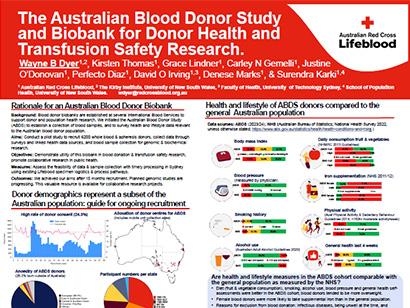
Poster Presented at ABNA
Poster presented on the ABDS study at the Australian Biospecimen Network Association
Read our scientific publications
- Karki S, Gemelli CN, Davison T, Masser BM, Marks DC, Bell K, Liu B, Hayen A, van den Hurk K, Irving DO. Willingness of blood donors in Australia to provide additional data and blood sample for health research. Transfusion 2021; 61: 2855-2861
- Karki S, Gemelli C, O'Donovan J, Dyer W, Jos C, Hirani R, Marks D, Irving D. Early Experience of Recruiting Donors into a Large Cohort Study and Biobank Transfusion 2023; 63, 232A-233A
